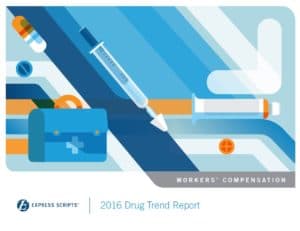
“In a year when many payers wrestled with drug price increases that dominated the news, Express Scripts protected clients from this impact,” said Dr. Brigette Nelson, senior vice president of workers’ compensation clinical management at Express Scripts. “By practicing pharmacy smarter, we helped clients balance appropriate care for injured workers while keeping costs down.”
Decrease in Opioid Use Drives Down Trend
In 2016, opioids remained the most expensive therapy class at $391.35 per user per year (PUPY). Thirteen of the top 25 workers’ compensation medications were opioids.
However, for the sixth year, overall opioid trend decreased. In 2016, trend decreased 13.4 percent due to a combination of Express Scripts’ clinical solutions, aggressive client management, and state and federal opioid regulatory trends.
This stark decrease in overall pharmacy trend — heavily driven by decreased opioid utilization — proves key stakeholders are taking action to combat the epidemic of opioid abuse and misuse:
- Payers: Through point-of-sale programs, physician outreach, patient education and advanced analytics, Express Scripts’ solutions enable payers to combat the safety and cost concerns associated with opioid use from every
- Prescribers: Scrutiny of opioid prescribing patterns drove the creation of new guidelines from the Centers for Disease Control and Prevention (CDC), as well as the Surgeon General’s Report on Facing Addiction in America.
- Regulatory: Many states have adopted or are considering formularies, opioid prescribing limits or other medical treatment
Bending the Curve on Compound Spending
For the third year in a row, spending on compounded medications decreased. In 2016, trend was -28.6 percent. These drugs still remain very costly, yet with a 31 percent decrease in utilization, it is clear that effective management strategies can reduce unnecessary costs and waste associated with more than 1,000 clinically unproven ingredients.
Optimizing the Dispensing Channel
Medication dispensed directly to injured workers by prescribers may result in additional costs as the drugs are typically repackaged or relabeled and often are not subject to the same pricing regulations as those dispensed by a pharmacy. Injured worker safety is also a concern.
“Physician-dispensed medications lack the point-of-sale safety edits which occur at a retail or home delivery pharmacy,” Nelson said. “This puts injured workers at risk for potential drug interactions or duplication of therapy.”
According to 2016 data, the average cost of a physician-dispensed medication was $219.25, compared to $110.16 for a pharmacy-dispensed medication. Express Scripts Workers’ Compensation clients therefore paid an average premium of about $109 for physician-dispensed medications and bypassed pharmacist review at the point of sale.
When prescriptions are filled through more costly channels, such as an out-of-network pharmacy or third-party biller, payers incur additional cost, with no additional value. This results in waste in the healthcare system.
For long-term medication needs, drugs delivered directly to an injured worker’s home cost payers 15 percent less than those purchased from a retail pharmacy, while adding convenience for the injured worker.
Continued Vigilance for Specialty Medication Trends
Spending on specialty medications to treat conditions such as hepatitis C and HIV stabilized in 2016. While these drugs represent less than 1 percent of all medications used by injured workers, the extreme high cost per prescription requires payers to stay vigilant.
“Managing specialty spend requires clinical expertise and strategic guidance,” Nelson said. “Clinicians at Express Scripts and our specialty pharmacy Accredo® have disease-specific experience to ensure safety, promote adherence and provide individualized clinical counseling for injured workers with the most complex conditions.”
The comprehensive review of trends in prescription drug spending for workers’ compensation plans is available at express-scripts.com/corporate.
About Express Scripts
Express Scripts puts medicine within reach of tens of millions of people by aligning with plan sponsors, taking bold action and delivering patient-centered care to make better health more affordable and accessible.
Headquartered in St. Louis, Express Scripts provides integrated pharmacy benefit management services, including network-pharmacy claims processing, home delivery pharmacy care, specialty pharmacy care, specialty benefit management, benefit-design consultation, drug utilization review, formulary management, and medical and drug data analysis services. Express Scripts also distributes a full range of biopharmaceutical products and provides extensive cost-management and patient-care services.
For more information, visit Lab.Express-Scripts.com or follow @ExpressScripts on Twitter.
Media Contact:
Ellen Drazen, Express Scripts 314-684-5355


















